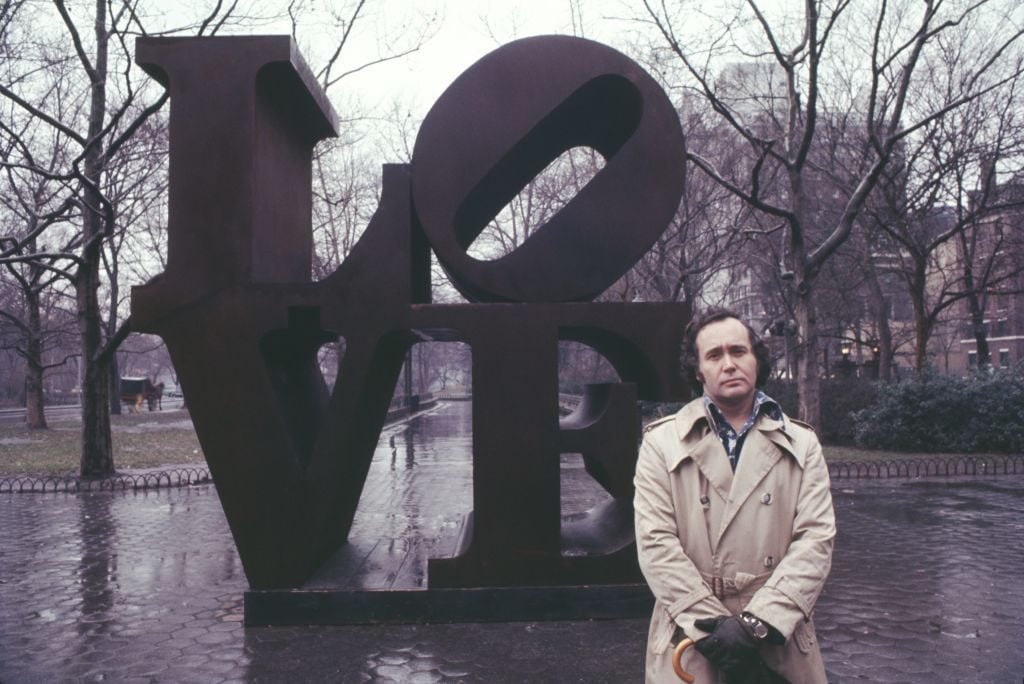Law & Politics
An Explosive Legal Filing Says a Publisher Hid or Forged Thousands of Robert Indiana Artworks and Documents
All of this is “just the tip of the iceberg,” the foundation says.

All of this is “just the tip of the iceberg,” the foundation says.

Eileen Kinsella

Just when it seemed that the complicated legacy of revered Pop artist Robert Indiana, who rose to worldwide fame in the 1960s with his iconic “Love” works, was finally being settled, the legal drama is heating up again.
In June, the artist’s estate, the Star of Hope Foundation, which Indiana established before his death, and the Morgan Art Foundation, which is not a nonprofit but holds the copyright to his most famous works, agreed to drop overlapping claims and counterclaims.
But now, the Morgan Art Foundation has filed a new motion involving New York-based publisher Michael McKenzie.
In the brief, filed in the Southern District of New York where the suit is ongoing, the foundation said it seeks to hold McKenzie accountable for allegedly forging Indiana’s artwork, defaming the foundation, and intentionally interfering with its exclusive contractual rights to reproduce the artist’s “Love” works.
In a scathing 30-page memo, dated December 10, the foundation said that McKenzie had defamed the organization publicly in various articles by falsely claiming it had not paid Indiana for due royalties before his death.
The foundation says it “caught McKenzie red-handed.”
“Indiana attested in writing that McKenzie was a forger,” the court papers say, adding: “Indiana confirmed on video that McKenzie was emotionally abusive and uncontrollable, and McKenzie’s own studio assistant recorded a video of McKenzie forging Indiana’s artworks in which she described the artworks as forgeries.”
The foundation is seeking case-terminating sanctions against McKenzie, which would mean a judgement for Morgan dismissing all of McKenzie’s arguments.
“Michael McKenzie’s desperate acts, as we outlined in our motion, reflect a stunning disregard for the justice system and the court’s orders,” attorney Luke Nikas, who represents the Morgan Art Foundation, told Artnet News. “We fully expect that he will be held accountable for what he’s done.”

Robert Indiana’s LOVE (1966–99) in Milwaukee, Wisconsin. The dating of the work offers some clues as to how scholars and the art market date contemporary works of art. Photo By Raymond Boyd/Getty Images.
All of this is “just the tip of the iceberg,” the document continues. It says that McKenzie forged Indiana’s work not only during his lifetime, but even after his death in May 2018 at the age of 89.
The foundation further alleges that McKenzie has “thousands of documents and artworks in his possession” that would reveal the extent of his scheme. It alleges that he lied under oath about evidence in his possession during probate hearings in Maine, where a court took stock of the artist’s assets, by concealing thousands of documents and artworks.
The foundation also says one of McKenzie’s former employees, Osvaldo Gonzalez, blew the whistle on him, adding that other employees later said he moved artworks to avoid detection, and lied about his reasons for doing so.
“We will be filing a response in several weeks and it will show Michael McKenzie never tried to conceal artwork,” McKenzie’s attorney, John Markham, told Artnet News in a phone interview.
McKenzie, he added, “moved the artwork to much better facilities, a public storage faculty where they would be safe from moisture and other things that can happen when it was stored on his premises in a barn.”
Markham said that McKenzie and Gonzalez, the former employee, had a falling out, and that when they tried to take Gonzalez’s deposition to test his allegations, Gonzalez asserted his Fifth Amendment rights and has refused to speak.
Markham also denies any forgery claims, saying that the Robert Indiana signature stamp used on certain artworks was authorized by the artist prior to his death.
“There is no forgery,” Markham said.